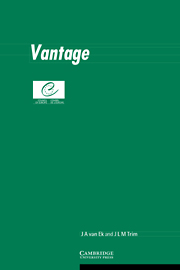Book contents
- Frontmatter
- Contents
- Introduction
- 1 The objective: levels of specificity
- 2 The objective: general characterisation
- 3 The objective: extended characterisation
- 4 The objective: components of the specification
- 5 Language functions
- 6 General notions
- 7 Topic-related tasks and lexicon
- 8 Discourse structure and verbal exchange
- 9 Dealing with texts: reading and listening
- 10 Writing
- 11 Sociocultural competence
- 12 Compensation strategies
- 13 Learning to learn
- 14 Degree of skill
- 15 By-products
- APPENDICES
Introduction
Published online by Cambridge University Press: 28 January 2010
- Frontmatter
- Contents
- Introduction
- 1 The objective: levels of specificity
- 2 The objective: general characterisation
- 3 The objective: extended characterisation
- 4 The objective: components of the specification
- 5 Language functions
- 6 General notions
- 7 Topic-related tasks and lexicon
- 8 Discourse structure and verbal exchange
- 9 Dealing with texts: reading and listening
- 10 Writing
- 11 Sociocultural competence
- 12 Compensation strategies
- 13 Learning to learn
- 14 Degree of skill
- 15 By-products
- APPENDICES
Summary
Vantage is the third level in a series of specifications of learning objectives developed within the Council of Europe's programme for the promotion of language learning in Europe. The series is intended to offer guidance and support to the many ‘partners for learning’ whose co-operation is necessary to the creation of a coherent and transparent structure of provision for effective learning relevant to the needs of the learners as well as of society, which normally provides the resources. Without setting up bureaucratic mechanisms of control, it provides a series of reference points, common objectives towards the achievement of which all can work independently but in harmony – curriculum planners, examining and qualifying authorities, course designers and materials producers, teacher trainers and last but by no means least the teachers and learners through whose interaction organised learning takes place.
The series is directed towards those – probably the great majority of ordinary language learners – who want to use another language for communication with people who speak it, both for transacting the business of everyday life and for exchanging information and opinions on private life and public affairs.
It therefore sets out to define in some detail what such an objective means in practice: what users of a language are most likely to wish or need to be able to do in the communication situations in which they take part and consequently what they have to know and the skills they have to develop in order to be able to communicate effectively in those situations.
- Type
- Chapter
- Information
- Vantage , pp. 1 - 6Publisher: Cambridge University PressPrint publication year: 2000



